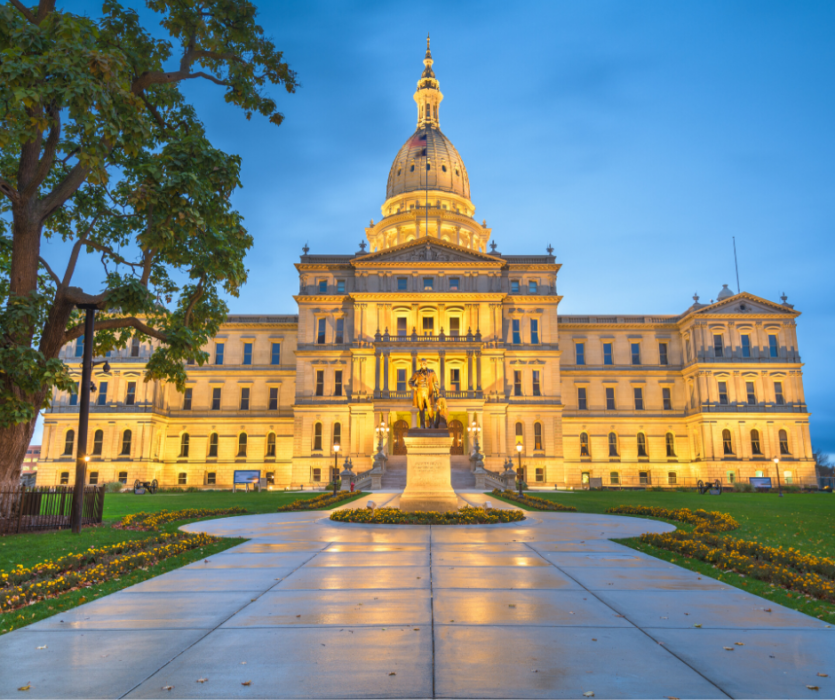
Gov. Gretchen Whitmer and legislative leaders finalized a deal to iron out the last 65 days of budget cuts, money transfers, and executive authority consternation, but it’s not all being made public for now.
The bills needed to consummate the agreement won’t be finished until this week, but details of the Administrative Board changes were discovered by MIRS late Wednesday evening.
Parts of the deal did start to move Wednesday, however.
The Senate unanimously passed a combined $573.5 million in restored funding ($261 million General Fund, $70 million School Aid Fund). The House and Senate passed a shell bill that will make some changes in state Administrative Board powers and a new July 1 budget deadline for lawmakers. A fourth piece is also part of the deal, MIRS has learned, but details on what that is weren’t available.
House Speaker Lee Chatfield (R-Levering) and Senate Majority Leader Mike Shirkey (R-Clarklake) ducked in and out of the governor’s Capitol office Wednesday to iron out the deal.
The end product looks a lot like what Chatfield and Whitmer came up with nearly a month ago but does include a version of statutory changes that Shirkey insisted upon, MIRS has learned.
The crafting of the exact language has begun but won’t be ready until this week when the Legislature is expected to wrap up session action for 2019. In concept, Whitmer would no longer have the unliteral authority to rearrange budgets with lawmakers sitting by to watch.
Instead, if she decides to use the State Administrative Board to do that, she must bring both chambers into the loop by giving them a 30-day window to sign off or object to her proposals. After the cooling-off period, she could act, but not without a legislative blessing.
The governor and the two Republican leaders agreed that if cornered by the media they would not release any details.
The movement came Wednesday so bills could satisfy the Constitution’s five-day requirement that bills first passed by one chamber sit for five days before being passed by another.
The $459 million spending bill is a collection of the major line-items Republican lawmakers separated out two months ago in 47 separate bills
The spending returned to circulation includes: $38 million in private college scholarships, $35 million for charter schools, $27.4 million for local governments in lieu of taxes (PILT payments), $16.6 million for rural healthcare, $15 million for IT upgrades, $14.8 million for county jails, $13.1 million for secondary road patrol, $10.5 million to hire new corrections officers, $10.7 million for pediatric psychiatrist raises, $10.5 million for early literacy coaches, $10 million for school security upgrades, $5.1 million for 37 “critical access” hospitals, $4.5 million for lead paint abatement, $4 million in veterans grants, $1.25 million for autism navigators and $350,000 for autism intervention.
The $13 million in individual bridge projects Whitmer vetoed is now going into the larger transportation budget for general road and bridge repair.
The supplementals — SB 0376 and SB 0377 — do not include the vetoed money for Pure Michigan nor the $175 million the governor wanted for her Reconnect Michigan program. She did get the funding scheme she wanted for the Department of Corrections so tethers can be replaced and prisoner programming can continue.
Whitmer also got the $10 million for the 2020 Census and $2 million for the implementation of Proposal 2. The $37.26 million for the Going Pro skilled trades training program didn’t make it into the bills.
“The governor is pleased that the House and Senate each took initial action on a supplemental budget that will restore critical funding for public health, public safety, and public education,” said Whitmer Press Secretary Tiffany Brown. “This is an important, bipartisan step forward for our state to ensure we are providing essential services to Michigan families and she is hopeful we can finalize it next week.”
More spending may be added next year in additional supplementals, but these bills are the only ones lawmakers will consider this year.
“While this does not restore all of the governor’s vetoes and transfers, it is a good first step in the right direction,” said Senate Appropriations Committee Chair Jim Stamas (R-Midland).
The other measures that make up the deal that passed Wednesday include:
– Rep. Shane Hernandez’s (R-Port Huron) HB 5176 and Sen. Aric Nesbitt’s (R-Lawton) SB 0616, which will ultimately lay out some changes to the state Administrative Board, passed on party-line votes in their respective chambers.
Remember, Whitmer on Oct. 1 used the seven-member Ad Board — made up of herself, the state superintendent and five other Democratic elected officials and appointees — to move around $625 million in funding, passed on party-line votes in each chamber.
– Rep. Greg VanWoerkom’s (R-Norton Shores) HB 5177 and Sen. Peter MacGregor’s SB 0618, which mandates that the Legislature provide the governor with the next year’s spending bill by July 1 passed unanimously in the bills’ respective chamber.
Chatfield told reporters after session that the day was “incredibly productive.”
“A lot of progress was made and I look forward to finalizing this deal and moving forward as a state next week,” he said.
Sen. Curtis Hertel Jr. (D-East Lansing) told reporters, “It is the first steps toward what a deal could look like. It’s a very positive sign. I would take my earlier prediction of 80% of this getting done to 90%.”